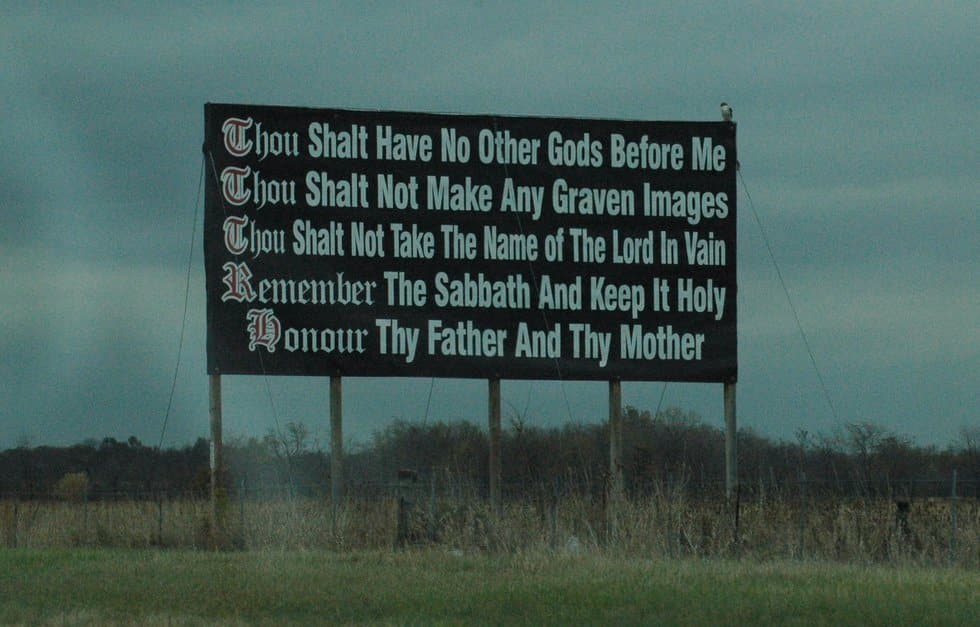In his 2022 book, Battle for the American Mind: Uprooting a Century of Miseducation, U.S. Secretary of Defense Pete Hegseth wrote that the U.S. education system is a 16,000 hour battle “for our kids and our country.” This view is popular within the Christian nationalist movement, of which Hegseth is a proponent—advocates see children as blank vessels for their worldview that the United States is God’s chosen land, and that Christians are meant to have dominion over it. Since the United States told white evangelicals they had to desegregate their schools, Christian nationalists have turned education into a political lightning rod and treated schools as ideological war zones, leaving hardworking teachers and impressionable students to suffer collateral damage.
This push for more religion in school comes on the heels of the “parents rights movement,” which makes transgender people, “wokeness,” and teachers deemed liberal scapegoats for all societal ills. This was intentional on the part of a handful of conservative and religious organizations. That’s why places such as Texas, Oklahoma, and Louisiana have seen a rise in bills meant to tear down the wall between church and state. Lawmakers in Louisiana, for example, have explicitly stated they want to expose kids to Christian morals through the public school system. Who better to help with that than a local hate group?
After the state passed a law mandating the display of the Ten Commandments in classrooms last year, Louisiana Family Forum (LFF), a conservative advocacy organization deemed a hate group by the Southern Poverty Law Center, started passing out Ten Commandments displays to local schools. In a brief phone conversation, LFF’s office manager told The Progressive that the group’s displays are in “about fifty classrooms,” while WAFB reported in February they had printed out enough for four of Louisiana’s sixty-four municipal areas, which are known in the state as parishes rather than counties. Louisiana has stated that compliance is voluntary, and it is not clear exactly how many schools have chosen to put the displays in class.
The rollout of the mandated displays has been slow, but one teacher in LaSalle Parish tells The Progressive that most in the school district are “excited to violate the Constitution.” The teacher, who requested to remain anonymous for fear of backlash, added that just about every school in the parish leads prayers with students before class, lunch, and football games, and that one school in the parish puts on an annual Christmas celebration that involves “girls as young as six portraying pregnant Mary.”
Louisiana is far from the only state attempting to erode the separation of church and state in public schools. In Iowa, Governor Kim Reynolds is expected to sign a bill into law that would require schools to teach that life starts at conception using mandatory ultrasound video presentations. Under a proposed West Virginia law, the Bible would be considered “historically accurate” classroom material. In Texas, public schools that adopt the Bluebonnet Learning curriculum—which teaches young children to read using Bible stories and presents biblical events as historical fact—receive an extra $60 in funding per student.
The teacher from LaSalle Parish told me they are considering displaying tenets of many other religions in their own classroom in a show of rebellion. Jacob Newsom, a Louisiana teacher from Ascension Parish, told CNN that if forced to comply with the Ten Commandments order, his compliance would be “malicious.” Chris Dier, who was named Louisiana Teacher of the Year in 2020, told NOLA.com that he believes the Ten Commandments bill is part of a larger national scheme to force religion into schools.
In September 2024, Dier brought a lawsuit against the state in order to block the Ten Commandments mandate, which is still in court. Following his lead, others have filed their own lawsuits, including the American Civil Liberties Union on behalf of nine families of various faiths with children in Louisiana public schools.
Other states have seen organized resistance to the encroachment of religious instruction in public schools as well.
Professor Ruth Braunstein, who studies resistance to Christian Nationalism at the University of Connecticut, says the resistance has been multifaceted in order to meet the multifaceted nature of the attacks against public education, which include not only religious displays and lessons, but the censoring of certain “undesirable” lessons in classrooms—such as books on LGBTQ+ people or race—and school privatization through so-called school choice programs.
The push for explicit religious curricula was aided by the Supreme Court’s 2022 Bremerton v Kennedy ruling in favor of a high school coach who prayed with his players. Though the appeals judge accused the Court of ruling based on false narratives, and others have accused Justice Neil Gorsuch of misrepresenting the facts of the case in his opinion, the decision has been cited in several statehouses as justification for more religious instruction in school, including in a Louisiana committee hearing on the Ten Commandments.
Forcing the Ten Commandments in public schools, Dier says, “is a part of a larger effort to erode separation of church and state.” There is evidence to support his claim: In the late 2010s, a handful of Christian organizations formed Project Blitz, a nationwide initiative to expand conservative Christian influence in public life, starting with easy-to-pass bills like Ten Commandments displays. Project Blitz’s work may even have served as inspiration for the Louisiana bill.
But two lawsuits currently being brought against Louisiana seek to challenge the Ten Commandments law’s constitutionality. Roake v. Brumley, which was initially filed in June 2024, involves nine Louisiana families who argue, alongside the American Civil Liberties Union, that their religious rights are being violated by the Ten Commandments mandate. The other is a lawsuit brought forth by Dier, who says he is representing teachers who should not be coerced into displaying the Ten Commandments and potentially isolating students.
The legal resistance to Roake v. Brumley resulted in the mandate being blocked in five parishes: East Baton Rouge, Livingston, Orleans, St. Tammany, and Vernon. The Roake ruling applies only to those five parishes, but school districts across the state are waiting to take action until there is a decision regarding Dier’s lawsuit. Newsom says the school board told the parish’s school system faculty that it would not be enacting a Ten Commandments ruling until it gets better guidance from the Louisiana Attorney General’s office on implementation. Across my conversations with teachers, the consensus is that most parishes are waiting to see the results of the ongoing cases—which, for the time being, have kept the Ten Commandments out of schools.
Although the judicial system benefitted resistors in Louisiana so far, the courts are no longer a safe bet like they were in decades prior. Under Chief Justice John Roberts, the U.S. Supreme Court has ruled in favor of religious organizations more than 80 percent of the time in oral arguments. On June 20, however, the ultra-conservative fifth district appeals court blocked the implementation of the Ten Commandments bill.
Texas’s legislature, which Amanda Tyler calls a “laboratory” for efforts to push Christian influence in public schools, has seen a sharp rightward tilt in recent years due to partisan gerrymandering and millions of dollars coming from Tim Dunn and Farris Wilks, two Texas preachers who also happen to be oil billionaires, elevating extremists Republicans during primaries. Tyler is the executive director of Baptist Joint Committee (BJC), a faith-based organization dedicated to protecting religious freedom for all.
In 2023, a bill allowing chaplains to be placed in schools was enacted in Texas, and more than a dozen states followed suit afterwards. The law allows chaplains to work as counselors in public schools without a counseling license, although many school boards have provisions that do not allow this. In 2025, the Texas legislative session started with a promise from one state lawmaker of “spiritual warfare.”
But Texans who are opposed to these measures aren’t backing down. In 2019, BJC started a campaign known as Christians Against Christian Nationalism, which has collected more than 40,000 signatures and created a diverse coalition of faith leaders and community members. To exert its influence, Tyler says, BJC has looked past state legislators to focus on local officials and train people on how to effectively oppose Christian Nationalism. “These extreme policies passed by the legislature are not necessarily getting implemented because of local resistance,” she continues.
In another sign of the growing resistance, more than 170 Texas chaplains signed a letter in September 2023 opposing the law allowing chaplains in schools, resulting in local news coverage that led many residents to call their local school boards. Due to this local pushback, Tyler says, “We saw a vast majority of school districts [not adopt the law].” Indeed, the twenty-five largest school districts in the state rejected the chaplain measure.
In a near-victory for the resistance, a coalition of faith leaders and citizens that had formed to oppose the Bluebonnet Curriculum in Texas showed up to denounce the curriculum at its public hearing held by the Texas Board of Education, where Tyler says detractors outnumbered supporters 3 to 1. Although the measure passed, the margin was 8 to 7 due to public outcry, with three of the “no” votes coming from Republicans.
Despite that disappointment, Tyler says that some school districts, such as Spring Independent School District, have rejected the curriculum; while others, such as Fort Bend Independent School District, have approved only a sample set of the curriculum after a tense school board meeting where parents voiced anger at the proposal.
The resistance is also active in Oklahoma, where in 2024 Superintendent of Public Instruction Ryan Walters attempted to force schools to purchase Trump Bibles for their classrooms. About seventy-five percent of school superintendents who responded to a survey stated they would not comply with Walters’s directive, which was blocked by the Oklahoma Supreme Court in March 2025.
Erin Brewer of Oklahoma Parent Legislative Advocacy Coalition (OKPLAC) tells The Progressive Oklahoma state leaders are willing to “blow the Constitution up on the backs of children,” citing the state’s attempt to establish the nation’s first religious public charter school. Yet even in this deeply red state, the state Attorney General, a Republican, brought a suit against the religious charter’s implementation in 2023, and in 2024, the Oklahoma State Supreme Court blocked the school’s creation.
According to Brewer, supporters of the religious charter hoped to force a case in front of the U.S. Supreme Court, to create a “precedent that would open the floodgates for more public funds to religious schools” all across the country. But while the Court agreed to take up the case in 2025, it ultimately let stand the lower court’s ruling to block the school in May.
OKPLAC, which filed the first lawsuit to stop the creation of the religious public school, is made up of “all public school parents and grandparents and volunteers,” Brewer says. “There is a groundswell here in opposition” to a religious public charter school receiving state funding, she says, and people have been making their voices heard at the state capital.
Supporters of the religious charter, reacting to the Supreme Court’s decision that keeps the lower court’s ruling in place, have vowed to bring another case before the justices. Brewer said that should that happen, people will continue to fight to block the school.
Tyler expresses hope to The Progressive about the future of standing up to the erosion of church-state separation. “The headwinds are strong,” she says, “but that just makes the resistance even stronger.”
This article was originally published in The Progressive and is reprinted here with permission.







